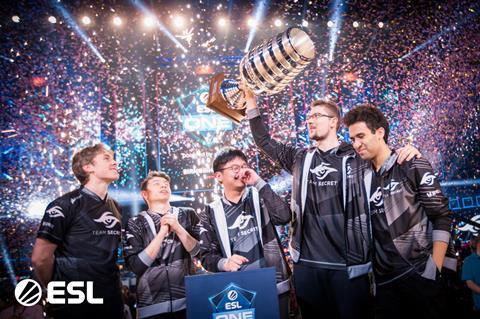Esports has burst into public consciousness in recent months thanks to a spate of stories about teenagers winning huge sums in competitions. Yet it’s still an unknown quantity to the general public. British Esports CEO Chester King aims to increase awareness and inspire future talent in the burgeoning market

In July, a 16-year-old US teenager won a record-breaking solo prize of $3m (£2.4m) to win the Fortnite World Cup at a competition in the Arthur Ashe Stadium in New York, a venue best known for hosting the US Open tennis tournament.
Then, in August a European team, OG, won one of the highest-profile and most lucrative esports tournaments, the Dota 2 International, for the second year in a row. OG’s five teammates shared the $15.6m (£12.7m) top prize after a six-day-long contest held at Shanghai’s Mercedes Benz Arena.
Despite these huge sums being won and the growing profile of its events, esports remains a rather misunderstood activity outside its young participants and those involved.
So much so that the first few minutes of a conversation with Chester King, the chief executive of the British Esports Association, is spent discussing the spelling of the word esports. It’s not eSports or e-sports – both of which are commonly used in print – but esports, as agreed with the Associated Press two years ago.
King, who will be part of the IBC session ‘Entry into esports ROI and expectations’, received authority from the UK Government in January 2016 to establish the not-for-profit association, partly to tackle such common misconceptions about esports – and also to promote esports in the UK, increase its level of awareness, improve standards and inspire future talent. Former UK Culture Secretary Ed Vaizey is the vice chair of the organisation.
King has a 27-year background in traditional sports, running golf and tennis club Stoke Park (owned by International Group), pre-Wimbledon tennis event The Boodles, as well as working for the Football Association, Lord’s and the Rugby Football Union. “I’m really pro the values of sport and what a great activity it is,” he stresses.
He got involved in esports after tracking the media interests of his son, who was born in 2000, noting that, like many in his generation, his TV consumption was going down while his interest in gaming was increasing. “And I saw what an amazing activity esports is as opposed to video games,” says King.
The difference, he says, is that esports is competitive video gaming, but is always ‘human vs human’.
As such, he says esports can teach key life skills – from communication through to tactics, leadership, strategy and competitiveness.
But all too often, he says, esports have simply been bracketed along with ‘mind-numbing video games’. He says British Esports was founded partly to give parents an informed view about esports.
“I realised there was not enough information about esports and its games and genres. As an adult, we know the difference between TV, music and film genres. We know, for example, what hip hop or classical is. But if I said, what is a MOBA or FPS – most adults wouldn’t have a clue.”
Recognised esports titles break down into four main categories: Multiplayer online battle arena (MOBA) games such as Fortnite, League of Legends and Dota 2; first-person shooters (FPS) like CSGO, Call of Duty and Overwatch; fighting games like Street Fighter and Smash Bros; and sports-based titles including FIFA, PES and Forza.
Competitors can play against each other online and also at spectator events in indoor arenas, usually for a cash prize. Depending on the game, the format can be 1v1, 3v3, 4v4, 5v5 and 6v6.
King says that, despite this element of competition between teams and players, esports is not a sport. He describes it as a modern kind of chess or bridge.
Fighting back
Esports has often come under attack precisely because it is not a sport that involves physical activity. Kids should still be doing sport, says King: “Esports isn’t to the detriment of sport. It is about what is happening at night when your children can’t play outside because it is dark or because of safety issues. Would you prefer them to watch Love Island, be on social media, or actually play an activity with their friends?”
He also says that esports is growing in schools, particularly because esports is so inclusive. Anybody can play – no matter their gender, ethnicity or physical ability. “You have kids who don’t traditionally play sport or aren’t in the choir or theatre club – but can be part of a team or part of a community with esports.”
‘The streamers have very much been making the money, to the detriment of the TV channels’
Each kind of esports game produces its own community, based around, say, Fortnite or Rocket League, and players specialise in one of these games. “It’s a bit like choosing to play baseball or cricket – they are completely different sports. Most people from the outside think it is just kids playing video games, but they don’t understand the differences between each one or skills that you have to have … if you are a Dota player, you would never play League of Legends.”
There are many different organisations involved in esports, from games developers, to tournament organisers, venues, teams, platforms and advisory services.
In terms of developers and publishers, some of the most well-known include Valve, Epic, Riot Games, Microsoft, Activision Blizzard, Capcom, Hi-Rez Studios and EA Sports. Many see esports events as a useful way to market their games, organising competitions and contributing to prize pots. Others licence their games for others to organise events.
Major tournament organisers include ESL, Major League Gaming (MLG), ELeague, DreamHack, Gfinity, Multiplay and others such as FaceIt, which has held the ECS CSGO finals at Wembley SSE Arena.
Big money
According to a recent Futuresource Consulting, esports revenues are expected to surpass $1 billion in 2020 – and to triple in the next five years. It’s a small but growing percentage of the total value of the games industry, which is worth around $135bn, including hardware and software.

Producing esports events requires a combination of specialist esports know-how, as well as experience of running large scale events. Each kind of esports game also requires a different production set up. League of Legends, for example, is a 5vs5 game that takes place on a Mobile Online Battle Arena (MOBA). Instead of a camera tracking a single ball around a pitch, 10 different characters are tracked around a virtual map. “If a player is about to do an amazing move, you have got to broadcast that in real time. And you’d only know about that if you were a proper esports person, and you had the manpower to track it,” says King. “It is not like you can just turn up and film it. It is incredibly labour-intensive.”
Twitch is the market leading online streaming platform for viewing esports events, with over 100m viewers a month.
Bought by Amazon in 2014 for $950 million, 75% of its users are male, and 73% are aged between 18-49. Fans will watch esports matches and other game content.
Due to the large revenues available in esports advertising, traditional and mainstream content providers such as Sky, with its dedicated esports channel Ginx Esports, have entered the market.
But esports’ young audience remains very much online, rather than watching on television. “The streamers have very much been making the money, to the detriment of the TV channels,” says King.
This online and broadcast viewing experience, combined with the fact that esports is fast becoming one of the world’s largest live spectator sports, means there are opportunities for the IT and AV industries.
Venue owners are upgrading their existing display offerings to meet the requirements of esports. Individual esports teams are already building dedicated home stadiums, some with extraordinary large AV installations. King says British Esports is also organising a national championship in schools, highlighting the fact that there is growing demand for esports kit from an increasingly broad range of sources.
“From a manufacturers point of view, they should definitely be engaging on a national basis with their national esports associations,” says King. “My advice for anyone interested in this space is do some research, go to events and engage with your local communities.”
Chester King will chair the Esports showcase Entry into esports ROI and expectations at IBC2019 on Tuesday 17 September.
-
IBC2019 takes place from 13-17 September at the RAI, Amsterdam
























No comments yet